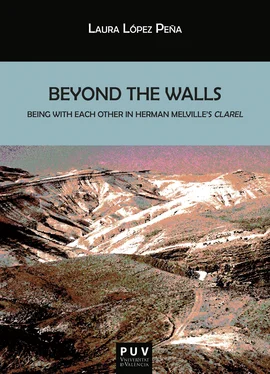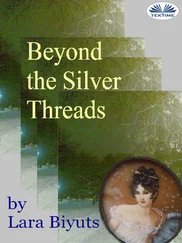Laura López Peña - Beyond the Walls.
Здесь есть возможность читать онлайн «Laura López Peña - Beyond the Walls.» — ознакомительный отрывок электронной книги совершенно бесплатно, а после прочтения отрывка купить полную версию. В некоторых случаях можно слушать аудио, скачать через торрент в формате fb2 и присутствует краткое содержание. Жанр: unrecognised, на английском языке. Описание произведения, (предисловие) а так же отзывы посетителей доступны на портале библиотеки ЛибКат.
- Название:Beyond the Walls.
- Автор:
- Жанр:
- Год:неизвестен
- ISBN:нет данных
- Рейтинг книги:3 / 5. Голосов: 1
-
Избранное:Добавить в избранное
- Отзывы:
-
Ваша оценка:
- 60
- 1
- 2
- 3
- 4
- 5
Beyond the Walls.: краткое содержание, описание и аннотация
Предлагаем к чтению аннотацию, описание, краткое содержание или предисловие (зависит от того, что написал сам автор книги «Beyond the Walls.»). Если вы не нашли необходимую информацию о книге — напишите в комментариях, мы постараемся отыскать её.
Beyond the Walls. — читать онлайн ознакомительный отрывок
Ниже представлен текст книги, разбитый по страницам. Система сохранения места последней прочитанной страницы, позволяет с удобством читать онлайн бесплатно книгу «Beyond the Walls.», без необходимости каждый раз заново искать на чём Вы остановились. Поставьте закладку, и сможете в любой момент перейти на страницу, на которой закончили чтение.
Интервал:
Закладка:
Melville’s (lack of) religion and religiosity, as expressed in his works, seem to partake of a universalist conception of humanity—“pagans and all included” ( Moby-Dick 63)—for, as Ishmael claims, we are all members of “the same ancient Catholic Church to which you and I, and Captain Peleg there, and Queequeg here, and all of us, and every mother’s son and soul of us belong; the great and everlasting First Congregation of this whole worshipping world; we all belong to that […]” (95). As Braswell notes, Melville’s life-long doubting nature was exceptional among the literary figures of the times:
None of the English men of letters affected by the skepticism of the time, such as Clough and Arnold, were hit quite so hard by their disillusionment. And in comparison with Melville, most of the eminent American authors of his day found happy answers to their questions. Emerson and Thoreau, with their transcendental theories, and Longfellow, Lowell, and Holmes, with their Unitarian views, were relatively contented and optimistic. Whittier was a good Quaker. Whitman’s worship of the universe buoyed him. Even Hawthorne, often morose on the problem of sin, was contented enough in his beliefs to pity Melville. (Braswell 3-4)
Melville was particularly critical of religious institutions and representatives who hypocritically promoted brotherhood and devotion by actually imposing dogma and neutralizing free thinking. When it comes to the author’s belief in God, William Braswell has no doubts about it, yet he adds that “it is not so easy to say just what he believed in regard to the nature of the Deity” (24). Other critics have followed Lawrance Thompson’s thesis that Melville was a rebel to the Calvinist God of his ancestors. These scholars have identified the author with Ahab’s revolt against the malevolent divinity, claiming that Melville’s quarrel with God was actually a lover’s quarrel (Thompson Quarrel 30). Following Thompson, and similar to Stan Goldman’s arguments on the hiddenness of the divinity, Daniel Paliwoda confuses Ahab’s passionate arguments against God in Moby-Dick with Melville’s, arguing that such rage ultimately reveals a devotion to God that demonstrates that Melville was not an atheist: “If an atheist, why shout against God? […] If one does not believe, why invest so much energy toward a nonexisting entity? It indicates the possibility that Melville wanted to believe, but could not find a satisfactory way of doing so” (104). Contrarily to Paliwoda, I contend that the fact that Melville constantly analyzed religion and God in his works is not necessarily a conclusive proof that he was a believer, since it was Melville’s permanent doubting nature, and not his belief in God, that led him to the “dismal deserts” which Hawthorne described in his account of the 1856 Melville he met in Liverpool. In Clarel , as a matter of fact, the Holy Land is constructed as a place with no God and where faith fails to provide that needed relief to the young seeker and many of his companions. Doubt and nothingness is actually what pervade at the end of the poem-pilgrimage. On Clarel ’s ending, James E. Miller has claimed that Melville proposes a balance between doubt and faith, without championing conventional Christian faith (217): “Melville does not seem to accept faith to the exclusion of doubt, but rather he advises Clarel (and surely himself) to reconcile heart (where faith and hope reside) and mind (where live doubt and despair), and to hold them in a balance of sanity. […] This is the advice that, heeded, could have saved Taji, Ahab, Pierre, and Mortmain from catastrophe and death” (216-217). While I mostly agree with Miller’s argument that Clarel is eventually advised to find a balance between doubt and hope that may keep him from reproducing the self-destructive madness that characterizes many of his companions in the poem (as well as his predecessors in other Melvillean works), in my opinion the young seeker moves away from religious faith at the end of his journey and is left, instead, with dislocation and spiritual barrenness after the death of his beloved Ruth. Believer or, in my opinion, non-believer, the only “truth” revealed to Clarel, although it is made ambiguous whether he is able to reach full awareness of it or remains unaware, is not his bond to God but his connection with humanity, “Cross-bearers all”, humans and animals, who “follow, slowly follow on” (4.34.43, 44).
Whether we consider him a believer or an atheist, still today, Melville continues resisting any impulse to categorize him within one group or the other. Neither is there just one Melville to categorize; as Babbalanja would claim in Mardi : “in one life-time we live a hundred lives” (1112), “though I have now been upon terms of close companionship with myself for nigh five hundred moons, I have not yet been able to decide who or what I am” (1111). If at other moments of his literary career Melville was able to cling to his faith and/or to God, Clarel reflects a much bleaker, if not completely nihilistic, sense of religious belief. Thus, Melville’s exploration of God and religion might have moved closer to unbelief in the latter decades of his life. This is latent in works such as Clarel —the poem’s portrayal of the Holy Land, not as the mystical place of a hidden God, as Goldman maintains, but as a no-God place where religion provides no consolation to characters who dive, and where no Divinity is eventually felt by these characters in the midst of their agony (both personal and global, as captured in the image of the Via Crucis and the [comm]union of universal “wail[s]”), against which each individual struggles in the most utter aloneness. Clarel presents a universalist understanding of the interconnectedness of individual pain as experienced by each different “form[…] of fate” ( Clarel 4.34.41). Obenzinger summarizes this interpretation, arguing that “[t]he final vision of multiplicity and unity deepens Clarel’s understanding of the common bond of suffering. Those he watches passing by, man or animal, become ‘Cross-bearers all’ (4.34.43), and he too joins the procession, despite the fact that the stones of Jerusalem remain blank” (“Wicked” 193).
Reflecting on the writer, Melville’s grand-daughter Eleanor Melville Metcalf asserted that “[f]rom the eighteen-fifties on […], he seldom went to church […]. He would on rare occasions go to All Souls’ Church in Fourth Avenue [a Unitarian Universalist Church in New York City founded in 1819], but for many years during the latter part of his life he did not do even this” (qtd. in Braswell 7). Whereas Elizabeth Melville was an active member in All Saints’ Church and a devout Unitarian, Herman Melville’s relationship with this Church seems to have been looser, and the part that he may have played within the congregation, which he joined in 1884, is unknown. Equally mysterious are the reasons why he decided to become a member in the first place. 6 Defining itself as supporting a “‘non-creedal’ religion”, All Souls’ states today, that “[w]e believe that personal experience, conscience and reason should be the final authorities in religion, and that in the end religious authority lies not in a book or person or institution, but in ourselves” (Rankin). These major principles were foundational to the community when Melville became a member. As a matter of fact, Minister emeritus of New York’s Unitarian Church of All Souls’ Walter D. Kring has argued that, by joining All Souls’, Melville “bound himself to no hierarchy, no creed, Christian or otherwise. He simply agreed to search for the truth and to adopt whatever he believed to be the truth for his own use” (130). The difference between All Souls’ quest for “the truth” and Melville’s possibly being that Melville was well aware that there might be no “truth” at all.
Читать дальшеИнтервал:
Закладка:
Похожие книги на «Beyond the Walls.»
Представляем Вашему вниманию похожие книги на «Beyond the Walls.» списком для выбора. Мы отобрали схожую по названию и смыслу литературу в надежде предоставить читателям больше вариантов отыскать новые, интересные, ещё непрочитанные произведения.
Обсуждение, отзывы о книге «Beyond the Walls.» и просто собственные мнения читателей. Оставьте ваши комментарии, напишите, что Вы думаете о произведении, его смысле или главных героях. Укажите что конкретно понравилось, а что нет, и почему Вы так считаете.










